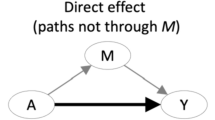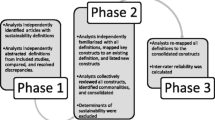Abstract
This special issue of theJournal of Behavioral Health Services & Research on mental health carve-outs brings together some of the latest research on recent policy and market changes affecting behavioral health services. This introductory article provides background information about carve-outs and the managed behavioral health care industry. This article also reviews prior research in the mental health carve-out field.
Similar content being viewed by others
References
Substance Abuse and Mental Health Services Administration:Managed Care Tracking System. Rockville, MD: various dates. Available at www.samhsa.gov.
Jensen GA, Morrisey MA, Gafney S, et al.: The new dominance of managed care: Insurance trends in the 1990s.Health Affairs 1997; 16(1):125–136.
Oss ME, Clary JH:Managed Behavioral Health Market Share in the United States, 1998–1999. Gettysburg, PA: Behavioral Health Industry News, 1998.
Iglehart JK: Managed care and mental health.New England Journal of Medicine 1996; 334:131–135.
Mark T, McKusick D, King E:National Expenditures for Mental Health, Alcohol, and Other Drug Abuse Treatment, 1996. Rockville, MD: U.S. Department of Health and Human Services, Substance Abuse and Mental Health Services Administration, 1998.
Cuffel BJ, Goldman W, Schlesinger H: Does managing behavioral health care services increase the cost of providing medical care?Journal of Behavioral Health Services & Research 1999; 26:371–379.
Grazier KL, Eselius LL, Hu, T, et al.: Effects of a mental health carve-out on use, costs, and players: A four-year study.Journal of Behavioral Health Services & Research 1999; 26:380–388.
Stein B, Reardon E, Sturm R: Substance abuse service utilization under managed care: HMOs versus carve-out plans.Journal of Behavioral Health Services & Research 1999; 26:450–455.
Gresenz CR, Sturm R: Who leaves managed behavioral health care?Journal of Behavioral Health Services & Research 1999; 26:389–398.
Ridgely MS, Giard J, Shern D: Florida's Medicaid mental health carve-out: Lessons from the first years of implementation.Journal of Behavioral Health Services & Research 1999; 26:399–414.
Manning WG, Liu CF, Stoner T, et al.: Outcomes for Medicare beneficiaries with schizophrenia under a prepaid mental health carve-out.Journal of Behavioral Health Services & Research 1999; 26:441–449.
Kapur K, Young AS, Murata D, et al.: The economic impact of capitated care for high utilizers of public mental health services: The Los Angeles PARTNERS program experience.Journal of Behavioral Health Services & Research 1999; 26:415–428.
Peele PB, Lave JR, Xu Y: Benefit limits in managed behavioral health care: Do They Matter?Journal of Behavioral Health Services & Research 1999; 26:429–440.
Vogelsang I: Economic aspects of mental health carve-outs.Journal of Mental Health Policy and Economics 1999; 2:29–41.
Wells KB, Sturm R, Sherbourne C, et al.:Caring for Depression. Cambridge, MA: Harvard University Press, 1996.
Hodgkin D, Horgan CM, Garnick DW: Make or buy: HMOs' contracting arrangements for mental health care.Administration and Policy in Mental Health 1997; 24(4):359–376.
Frank RG, McGuire TG: Savings from a Medicaid carve-out for mental health and substance abuse services in Massachusetts.Psychiatric Services 1997; 48(9):1147–1152.
Frank RG, McGuire TG: Parity for mental health and substance abuse care under managed care.Journal of Mental Health Policy and Economics 1998; 1(4):153–160.
Ma C, McGuire T: Costs and incentives in a mental health carve-out.Health Affairs 1998; 17(2):53–69.
Sturm R, MCulloch J, Goldman W: Mental health and substance abuse parity: A case study of Ohio's state employee program.Journal of Mental Health Policy and Economics 1998; 1:129–134.
Frank RG, McGuire TG, Newhouse JP: Risk contracts in managed mental health care.Health Affairs 1995; 14:50–64.
Frank RG, Huskamp HA, McGuire TG, et al.: Some economics of mental health carve-outs.Archives of General Psychiatry 1996; 53:933–937.
Sturm R: How Does Risk Sharing between Employers and Managed Behavioral Health Organizations Affect Mental Health Care?Health Services Research, in press.
Sturm R:Managed Care Risk Contracts and Substance Abuse Treatment. Working Paper153. Los Angeles: UCLA/RAND Research Center on Managed Care for Psychiatric Disorders, 1999.
American Medical Association, Council on Ethical and Judicial Affairs: Financial incentives to limit care: Financial implications for HMOs and IPAs. In:Code of Medical Ethics: Report of the Council on Ethical and Judicial Affairs of the American Medical Association Vol. 1. Chicago: American Medical Association, 1990, pp. 130–135.
American Medical Association, Council on Ethical and Judicial Affairs: Ethical issues in managed care.Journal of the American Medical Association 1995; 273, 330–335.
Relman AS: Dealing with conflict of interest.New England Journal of Medicine 1985; 313:749–751.
Relman AS: Salaried physicians and economic incentives.New England Journal of Medicine 1988; 319:784.
Goldman W, McCulloch J, Sturm R: Costs and utilization of mental health services before and after managed care.Health Affairs 1998; 17(2):40–52.
Huskamp HA: How a managed behavioral health care carve-out plan affected spending for episodes of treatment.Psychiatric Services 1998; 49(12):1559–1562.
Norton EC, Lindrooth RC, Dickey B: Cost shifting in a mental health carve-out for the AFDC population.Health Care Financing Review 1997; 18:95–108.
Norton EC, Lindrooth RC, Dickey B: Cost-shifting in managed care.Mental Health Services Research. In press.
Sturm R: Cost and quality trends under managed care: Is there a learning curve in behavioral health carve-out plans?Journal of Health Economics. In press.
Merrick EL: Treatment of major depression before and after implementation of a behavioral health carve-out plan.Psychiatric Services 1998; 49(11):1563–1567.
Stein B, Orlando M, Sturm R: Follow-up Care after Inpatient Detoxification under Managed Care.Psychiatric Services, in press.
Sturm R, Klap R: Use of psychiatrists, psychologists and master's-level therapists in managed behavioral health care carve-out plans.Psychiatric Services 1999; 50:504–508.
Newcomer R, Preston S, Harrington C: Health plan satisfaction and risk of disenrollment among HMO and fee-for-service recipients.Inquiry 1996; 33:144–154.
Mechanic D: The changing face of mental health managed care.New Directions in Mental Health Services 1998; 78:7–14.
Essock SM, Goldman HH: States' embrace of managed mental health care.Health Affairs 1995; 14:34–44.
Hall LL, Edgar ER, Flynn LM:Stand and Deliver: Action Call to a Failing Industry. Arlington, VA: National Alliance for the Mentally Ill, 1997.
Managed Care: A National Overview—Where We Stand. Arlington, VA: National Alliance for the Mentally Ill, 1999.
American Psychiatric Association: Dr. Munoz's Statement on Montana State Mental Health Program. Release 99-6, February 17, 1999.
Chang CF, Kiser LJ, Bailey JE, et al.: Tennessee's failed managed care program for mental health and substance abuse services.Journal of the American Medical Association 1998; 279:864–869.
Brooks C, Rother C: County mental health pact at risk: System's mounting woes blamed on private firm.San Diego Union Tribune, November 29, 1998.
Callahan JJ, Shepard DS, Beinecke RH, et al.: Mental health/substance abuse treatment in managed care: The Massachusetts Medicaid experience.Health Affairs 1995; 14:173–184.
Dickey B, Normand SL, Norton EC, et al.: Managing the care of schizophrenia: Lessons from a 4-year Massachusetts Medicaid study.Archives of General Psychiatry 1996; 53:945–952.
Dickey B, Norton EC, Normand EL, et al.: Managed mental health experience in Massachusetts.New Directions in Mental Health Services 1998; 78:115–122.
Rohland BM: Implementation of Medicaid managed mental health care in Iowa: Problems and solutions.Journal of Behavioral Health Services & Research 1998; 25(3):293–299.
Bloom JR, Hu T, Wallace N: Mental health costs and outcomes under alternative capitation systems in Colorado: Early results.Journal of Mental Health Policy and Economics 1998; 1:3–14.
Christianson J, Manning WG, Lurie N: Utah's prepaid mental health plan: The first year.Health Affairs 1995; 14:150–172
Lurie N, Christianson JB, Gray DZ: The effect of the Utah Prepaid Mental Health Plan on structure, process, and outcomes of care.New Directions in Mental Health Services 1998; 78:99–114.
Stoner T, Manning W, Christianson J: Expenditures for mental health services in the Utah Prepaid Mental Health Plan.Health Care Financing Review 1997; 18:73–93
Young AS, Sullivan G, Murata D: Implementing publicly funded risk contracts with community mental health organizations.Psychiatric Services 1998; 49:1579–1584.
Health Care Plan Design and Cost Trends—1988 through 1997. Washington, DC: Hay Group, 1998.
Sturm R, Pacula R: State mental health parity legislation: Determinant or cause of utilization differences?Health Affairs. 1999; 18:182–192.
Varmus HE:Parity in Financing Mental Health Services: Managed Care Effects on Cost, Access & Quality. An Interim Report to Congress by the National Advisory Mental Health Council. NIH Publication 98-4322. Rockville, MD: National Institute of Mental Health, National Mental Health Advisory Council, U.S. Department of Health and Human Services, 1998.
Sturm R, McCulloch J: Mental health and substance abuse benefits in carve-out plans and the Mental Health Parity Act of 1996.Journal of Health Care Finance 1998; 24(3):84–95.
Frank RG, Koyanagi C, McGuire TG: The politics and economics of mental health parity laws.Health Affairs 1997; 16:108–119.
Sturm R: How expensive is unlimited mental health care coverage under managed care?Journal of the American Medical Association 1997; 278(18):1533–1537.
Sturm, R, Zhang W, Schoenbaum M: How expensive are unlimited substance abuse benefits under managed care?Journal of Behavioral Health Services & Research 1999; 26(2):203–210.
Author information
Authors and Affiliations
Corresponding author
Rights and permissions
About this article
Cite this article
Sturm, R. Tracking changes in behavioral health services: How have carve-outs changed care?. The Journal of Behavioral Health Services & Research 26, 360–371 (1999). https://doi.org/10.1007/BF02287297
Issue Date:
DOI: https://doi.org/10.1007/BF02287297




